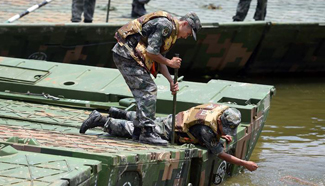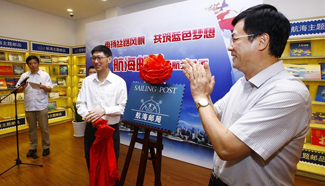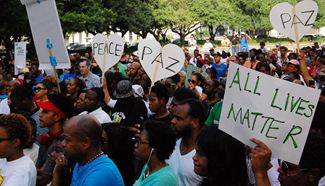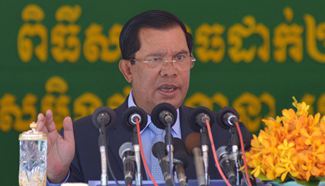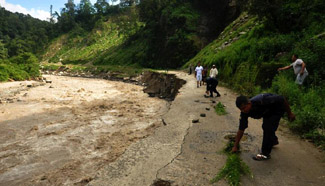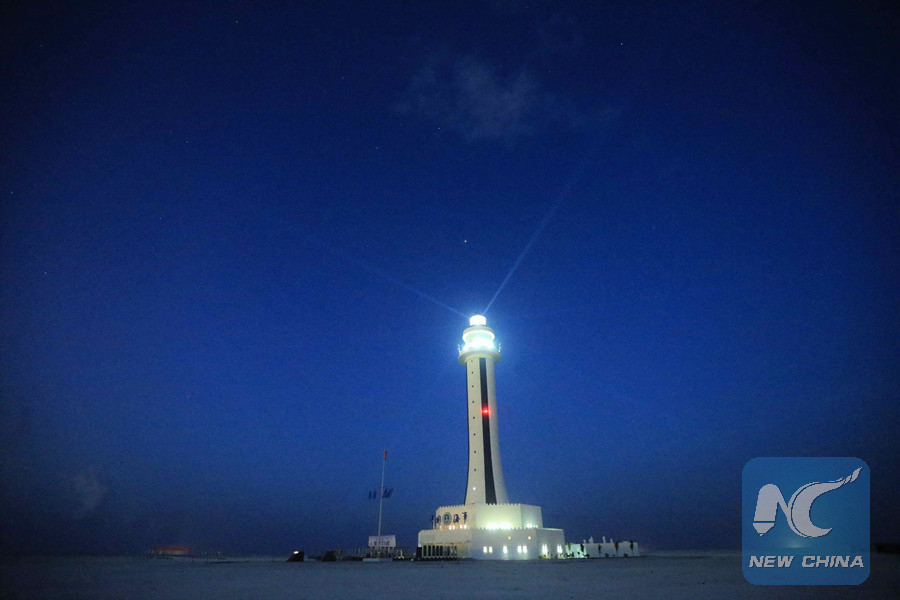
Photo taken on April 5, 2016 shows the lighthouse on Zhubi Reef of Nansha Islands in the South China Sea, south China. (Xinhua file photo)
BEIJING, July 11 (Xinhua) -- Major Chinese newspapers have slammed the Philippines' so-called South China Sea arbitration, saying it impairs the impartiality and authority of the international legal system.
The People's Daily, the Communist Party of China's official newspaper, carried a commentary on Monday, saying the arbitration is "a ruse against China which was instigated and manipulated by the United States, initiated by the Philippines, and with cooperation from the arbitral tribunal."
Nearly 70 countries and regional organizations have voiced support for China's stance of not accepting or participating in the arbitration, and not recognizing the so-called "award," it said.
They did this because this stance is with full legal basis, while the arbitral tribunal's illegal expansion and abuse of jurisdiction, on the other hand, is sabotage of international law, the article read.
"By abusing the compulsory arbitration procedures, the Philippines and arbitral tribunal have eroded the authority of the United Nations Convention on the Law of the Sea (UNCLOS). Its damage to the UNCLOS and impact on the international legal order should not be underestimated," it read.
The article quoted Bruce Fein, a veteran U.S. constitutional lawyer, as saying that there is a dangerous "psychology of the empire" in the U.S. policy on the South China Sea.
Despite its reluctance to accede to the UNCLOS over past decades, the United States has kept preaching UNCLOS and used it as an excuse to point fingers at other countries, it said,
"The U.S. only considers international law applicable when it serves its own interests and would abandon it when it does not," it read.
The contradictory and double-standard attitude exposes the hypocritic nature and deep-rooted "psychology of the empire" of the United States, which, in essence, is hegemonism, according to the article.
In an article carried by Sunday's Guangming Daily, Wang Hanling and Peng Sixiang, researchers with the Chinese Academy of Social Sciences, described an arbitrator and an expert witness connected to the arbitration as "chameleons" who reversed their previous position as stated in published papers.
Citing Arbitrator Alfred H.A. Soons from the Netherlands as an example, the article said Soons has expressed his opinion publicly at least twice over the years that when two countries have overlapping claims over waters, issues about th legal status and maritime rights of islands and reefs cannot be separated from the maritime delimitation disputes between the two countries, and they form an integral part of maritime delimitation.
However, when the tribunal ruled on jurisdiction and admissibility, Soons reversed his position and joined with four other arbitrators in saying that the tribunal has the right to decide on the Philippines' submissions concerning legal status and maritime entitlement of certain islands, according to the article.
The disregard of facts and self-contradiction of some arbitrators and expert witnesses is sure to cast doubts on the impartiality of the tribunal's "award", the article said.
In another article in Sunday's People's Daily, Yi Xianhe, an expert on international law from China's Wuhan University, said the arbitral tribunal has damaged the impartiality of the international law system and people will realize in the end that the only solution to the South China Sea dispute is negotiation between the disputing parties.
Related:
Commentary: U.S. should stop treating South China Sea as next Caribbean
MEXICO CITY, July 10 (Xinhua) -- The United States should stay away from the South China Sea issue and avoid repeating its history of military intervention and political manipulation in the Caribbean in the past century.
The Permanent Court of Arbitration (PCA) in The Hague will announce its award on Tuesday in an arbitration case filed unilaterally by the Philippines against China on disputes over the South China Sea. Full Story
Commentary: U.S. cold-war mentality not solution to South China Sea issue
BEIJING, July 9 (Xinhua) -- The South China Sea arbitration initiated by the Philippines and without China's consent is a political farce.
The reason is simple: the United States is using the administration of former Philippine President Benigno S. Aquino III to raise tensions in the region. Full Story





